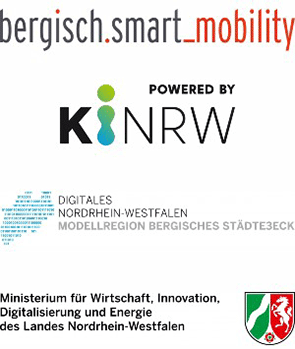BERGISCH.SMART: AI AS AN ENABLER OF FUTURE MOBILITY
To work on the challenges of tomorrow, to develop opportunities for the region, to prove feasibility prototypically and to define standards, AI-based mobility will be established directly in selected quarters of the cities Remscheid, Solingen and Wuppertal.
Artificial intelligence may be regarded as the core technology for automated, networked mobility. The associated future business models and user behaviour in urban areas are subject to a disruptive transformation process, which on the one hand has to be prepared technologically, but on the other hand also requires the participation of citizens. In order to support the region of the Bergisches Städtedreieck in dealing with the challenges of the so-called mobility turnaround, five identified fields of action are being worked on in the project “Bergisch.Smart: AI as Enabler for the Mobility of Tomorrow” (see diagram).

Field of action 1 – Enabling Automotive Innovation: Future-proof profiling of the business and science location Bergisches Städtedreieck
If we first turn to technological availability, major OEMs (Original Equipment Manufacturers, such as Volkswagen, BMW, etc.) are already planning driverless city movers for the 2024/25 time horizon, which, however, require a completely new architecture for ECU networking, the on-board system, power supply and, in particular, the computing platform for artificial intelligence algorithms. The future belongs to “Smart Vehicle Architecture”, which must be conceived and designed now. The Bergische supplier industry can and should take on this task in order to secure technological competence and to locate the added value in a later series production in the region in the future.
Field of action 2 – Mobility-as-a-Service in public transport: Making the Bergische Region fit for the platform economy in the mobility sector
Artificial intelligence enables public transport operators to open up so-called “services on demand” or “ride hailing” concepts for themselves as new business fields. Challenges in this context are the tension between public transport and private providers and the confidence of the population as a basis for customer demand. Wuppertaler Stadtwerke are pioneers in this field and will already design, develop with partners and subsequently introduce AI-based routing and network planning tools.
Field of action 3 – Bergisch.Lab in the urban district: Testing autonomous driving technologies under real conditions
The project will test the newly developed systems and concepts in the sense of a real laboratory in the neighbourhood (in everyday life) so that companies in the supply industry as well as municipal companies, such as municipal utilities, can gain early experience with the newly developed systems and concepts and optimise them. In this way, citizens should also gain early access to and familiarity with the new mobility concepts.
Field of action 4 – Recognising the environment and optimising traffic: Use the data treasures of the Bergische Städte as the fourth sensor of the vehicles and network them with the infrastructure
In addition, the Bergische Gemeinden have high-resolution 3D data and geoinformation at their disposal, which will be standardised for use in automated vehicles on the one hand and tested in close cooperation with industry on the other. This enables a novel visualization of the environment within vehicles and on smartphones. Furthermore, discrepancies between sensor data and digital maps can be communicated in real time and used to update the data material (Next Generation Environmental Perception Algorithms). In the sense of a marketplace, prepared geodata can also be made available to citizens and businesses via an Internet platform. The traffic control centres of the municipalities can also use AI-based technologies to offer both individual traffic and the public transport service on demand shown in action field 2 added value in terms of traffic flow optimisation and parking space management.
Field of action 5 – Mobility as a task for society as a whole: Integrating citizens and SMEs as designers and users into the innovation ecosystem
The technical and structural changes described in the other fields of action have a major impact on citizens and businesses. It is therefore important to involve them at an early stage as designers and users of AI-based mobility concepts by involving them in project work (in the various fields of action) or by taking them on a “journey” through context-specific information events.
The five fields of action described above will be developed in four projects, continuously accompanied and advised by an advisory board of high-ranking representatives of the digital model region Bergisches Städtedreieck. A detailed description of the subprojects can be found on the following pages.

